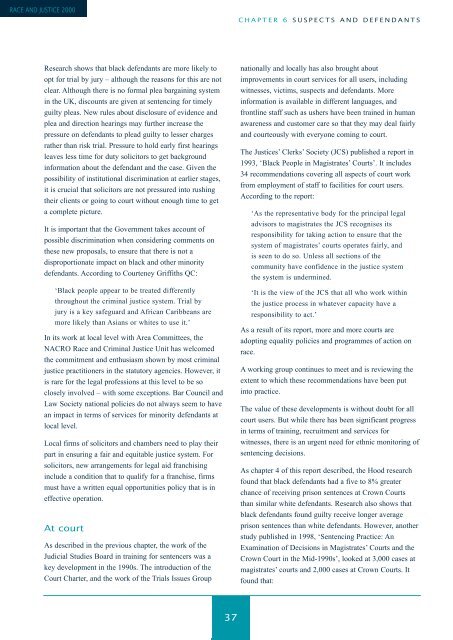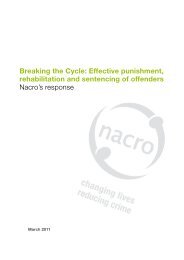Let's get it right: race and justice 2000 - Nacro
Let's get it right: race and justice 2000 - Nacro
Let's get it right: race and justice 2000 - Nacro
- No tags were found...
You also want an ePaper? Increase the reach of your titles
YUMPU automatically turns print PDFs into web optimized ePapers that Google loves.
RACE AND JUSTICE <strong>2000</strong>CHAPTER 6 SUSPECTS AND DEFENDANTSResearch shows that black defendants are more likely toopt for trial by jury – although the reasons for this are notclear. Although there is no formal plea bargaining systemin the UK, discounts are given at sentencing for timelyguilty pleas. New rules about disclosure of evidence <strong>and</strong>plea <strong>and</strong> direction hearings may further increase thepressure on defendants to plead guilty to lesser chargesrather than risk trial. Pressure to hold early first hearingsleaves less time for duty solic<strong>it</strong>ors to <strong>get</strong> backgroundinformation about the defendant <strong>and</strong> the case. Given thepossibil<strong>it</strong>y of inst<strong>it</strong>utional discrimination at earlier stages,<strong>it</strong> is crucial that solic<strong>it</strong>ors are not pressured into rushingtheir clients or going to court w<strong>it</strong>hout enough time to <strong>get</strong>a complete picture.It is important that the Government takes account ofpossible discrimination when considering comments onthese new proposals, to ensure that there is not adisproportionate impact on black <strong>and</strong> other minor<strong>it</strong>ydefendants. According to Courteney Griff<strong>it</strong>hs QC:‘Black people appear to be treated differentlythroughout the criminal <strong>justice</strong> system. Trial byjury is a key safeguard <strong>and</strong> African Caribbeans aremore likely than Asians or wh<strong>it</strong>es to use <strong>it</strong>.’In <strong>it</strong>s work at local level w<strong>it</strong>h Area Comm<strong>it</strong>tees, theNACRO Race <strong>and</strong> Criminal Justice Un<strong>it</strong> has welcomedthe comm<strong>it</strong>ment <strong>and</strong> enthusiasm shown by most criminal<strong>justice</strong> pract<strong>it</strong>ioners in the statutory agencies. However, <strong>it</strong>is rare for the legal professions at this level to be soclosely involved – w<strong>it</strong>h some exceptions. Bar Council <strong>and</strong>Law Society national policies do not always seem to havean impact in terms of services for minor<strong>it</strong>y defendants atlocal level.Local firms of solic<strong>it</strong>ors <strong>and</strong> chambers need to play theirpart in ensuring a fair <strong>and</strong> equ<strong>it</strong>able <strong>justice</strong> system. Forsolic<strong>it</strong>ors, new arrangements for legal aid franchisinginclude a cond<strong>it</strong>ion that to qualify for a franchise, firmsmust have a wr<strong>it</strong>ten equal opportun<strong>it</strong>ies policy that is ineffective operation.At courtAs described in the previous chapter, the work of theJudicial Studies Board in training for sentencers was akey development in the 1990s. The introduction of theCourt Charter, <strong>and</strong> the work of the Trials Issues Groupnationally <strong>and</strong> locally has also brought aboutimprovements in court services for all users, includingw<strong>it</strong>nesses, victims, suspects <strong>and</strong> defendants. Moreinformation is available in different languages, <strong>and</strong>frontline staff such as ushers have been trained in humanawareness <strong>and</strong> customer care so that they may deal fairly<strong>and</strong> courteously w<strong>it</strong>h everyone coming to court.The Justices’ Clerks’ Society (JCS) published a report in1993, ‘Black People in Magistrates’ Courts’. It includes34 recommendations covering all aspects of court workfrom employment of staff to facil<strong>it</strong>ies for court users.According to the report:‘As the representative body for the principal legaladvisors to magistrates the JCS recognises <strong>it</strong>sresponsibil<strong>it</strong>y for taking action to ensure that thesystem of magistrates’ courts operates fairly, <strong>and</strong>is seen to do so. Unless all sections of thecommun<strong>it</strong>y have confidence in the <strong>justice</strong> systemthe system is undermined.‘It is the view of the JCS that all who work w<strong>it</strong>hinthe <strong>justice</strong> process in whatever capac<strong>it</strong>y have aresponsibil<strong>it</strong>y to act.’As a result of <strong>it</strong>s report, more <strong>and</strong> more courts areadopting equal<strong>it</strong>y policies <strong>and</strong> programmes of action on<strong>race</strong>.A working group continues to meet <strong>and</strong> is reviewing theextent to which these recommendations have been putinto practice.The value of these developments is w<strong>it</strong>hout doubt for allcourt users. But while there has been significant progressin terms of training, recru<strong>it</strong>ment <strong>and</strong> services forw<strong>it</strong>nesses, there is an urgent need for ethnic mon<strong>it</strong>oring ofsentencing decisions.As chapter 4 of this report described, the Hood researchfound that black defendants had a five to 8% greaterchance of receiving prison sentences at Crown Courtsthan similar wh<strong>it</strong>e defendants. Research also shows thatblack defendants found guilty receive longer averageprison sentences than wh<strong>it</strong>e defendants. However, anotherstudy published in 1998, ‘Sentencing Practice: AnExamination of Decisions in Magistrates’ Courts <strong>and</strong> theCrown Court in the Mid-1990s’, looked at 3,000 cases atmagistrates’ courts <strong>and</strong> 2,000 cases at Crown Courts. Itfound that:37

















